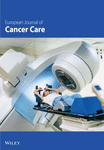The physical and psycho-social experiences of patients attending an outpatient medical oncology department: a cross-sectional study
Abstract
The aim of this study was to assess the prevalence and predictors of physical symptoms, anxiety, depression and perceived needs among patients receiving treatment at an outpatient medical oncology department using a cross-sectional survey. It was carried out at the outpatient clinic of an academic medical oncology department, which sees around 150–180 outpatients each week; 201 patients were selected. These patients answered questions to assess their levels of anxiety and depression (Hospital Anxiety and Depression Scale), perceived needs (Cancer Needs Questionnaire)and the frequency and severity of 15 physical symptoms. Fatigue, nausea, appetite loss and vomiting were the most commonly experienced and most debilitating physical symptoms. Approximately 25% of participants had borderline or clinical levels of anxiety and depression. Although relatively low levels of perceived needs were reported, physical and psychological needs were the most common. Levels of each outcome measure tended to be predictive of each other. Medical oncology outpatients experience a wide range of physical and psycho-social problems which appear, to some extent, interrelated.




